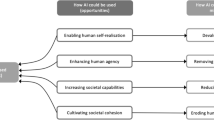Abstract
Exemplars, or concrete problems and resolutions, play a far more central role in business ethics than do detailed rules. Exemplars, such as case studies, anecdotes, parables, and fables, are nearly as important as general ethical principles.
There are four arguments for recognizing this essential role for exemplars in business ethics. First, exemplars facilitate impartial agreement where agreement on detailed moral rules eludes us. Second, exemplars uniquely facilitate, for the purposes of training and decision making, the balanced integration of diverse sets of values. Third, the use of exemplars appropriately cultivates personal judgment, making detailed moral roles useful in exceptional cases only. Fourth, exemplars provide the flexibility necessary for making moral decisions within the continued flux of responsible business life.
Similar content being viewed by others
Author information
Authors and Affiliations
Additional information
Paul de Vries is an Associate Professor at Wheaton College, Wheaton, Illinois.
Rights and permissions
About this article
Cite this article
deVries, P. The discovery of excellence: The assets of exemplars in business ethics. J Bus Ethics 5, 193–201 (1986). https://doi.org/10.1007/BF00383625
Issue Date:
DOI: https://doi.org/10.1007/BF00383625




